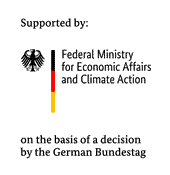AI-Readiness of Standards
Artificial intelligence will only develop its full potential if it is used in accordance with recognized quality standards that ensure that AI applications are safe, reliable and resilient and that they are used in accordance with societal values. Norms and standards are a tried-and-tested way of realizing such quality benchmarks. An "AI made in Europe" brand based on high-quality norms and standards can be a key competitive factor for the German and European economy.
Since the development of AI technologies is already advanced, a large part of all existing DIN-Standards, currently more than 30,000 documents, is likely to already have many points of contact with AI technologies. The German government's AI strategy therefore explicitly formulates an analysis of the body of standards as a measure. This means developing an overview of which standards are relevant to the use of AI technologies in their area of application or even already enable this. For this reason, DIN has launched the "AI readiness of standards" project on behalf of the German Federal Ministry of Economics and Climate Protection (BMWK). They are supported by AI experts from the Fraunhofer Big Data & Artificial Intelligence Alliance. The project pursues two goals, with the first having the greater weight.
1. Identification and description of the relation of relevant standards to AI technologies:
In a first step, the project team has developed a testing methodology to operationalize the term 'AI readiness'. This is intended to allow experts to assess whether the contents of the standard have points of contact with AI technologies in practice and how the standard can be revised to take AI-relevant aspects into account. This is done based on evaluation criteria that are developed in workshops with AI and standardization experts. During a pilot phase, the test procedure us currently tested in selected standards committees. To support the manual test procedure, particularly in the selection and classification of AI-relevant standards, AI experts are also developing a process supported by an AI tool. The application of the AI readiness criteria, supported by the AI-supported testing methodology, will then be extended in the next step to the testing of standards from various specialist areas. In this process, the application of the testing method will be learned and improved, and the AI tool will be trained.
2. Support for the development of machine executability of standards:
The machine executability of standards (SMART Standards) aims to prepare and structure standards content in such a way that it is initially readable by machines, software or other application systems and, in addition, can then be applied in an automated manner in a technological environment.
This enables direct further utilization of standards and their content in downstream processes. Companies in particular are expecting great efficiency gains in the future from the machine executability of standards. The machine executability of standards is already being investigated on the basis of initial pilot projects. The "AI Readiness of Standards" project is now intended to build the bridge to AI-specific use cases and to derive any requirements for machine interpretability or future possible uses. The knowledge gained from the project is to be incorporated into the "Initiative Digitale Standards" (IDiS) network and create synergies.
Two perspectives are particularly important for the project, which are to complement each other in an integrating manner: the technical and standardization knowledge from the standards committees and the AI expertise on AI methods. The AI knowledge is brought into the project by the Fraunhofer Big Data & Artificial Intelligence Alliance. The involvement of AI experts thus makes a significant contribution to the consideration of new technological developments in standardization.
Project Objectives
- Methodology for assessing the AI readiness of standards;
- First standards reviewed and evaluated;
- Revision recommendations of AI-relevant standards that were assessed as not AI-ready;
- Prototype AI tool for machine-assisted evaluation of 30.000 standards.
Project Duration
January 2022 to June 2024
Project Coordinator
DIN e. V.
Project Partners
- Fraunhofer Big Data & Artificial Intelligence Alliance,
- DIN Media and
- DIN Solutions.
Project Funding
This project is funded by the German Federal Ministry of Economics and Climate Protection (BMWK) as part of the implementation of the German government's AI strategy.
